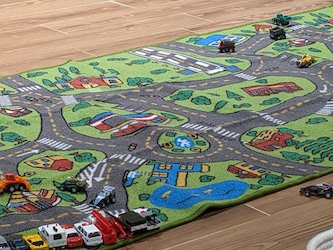
We take care of our three year old grandson on Thursdays. Being “that kind” of grandparents we tend to buy things we think he might like. Our most recent purchase was a streetscape rug (see photo) where he can play with his prodigious quantity of cars and, especially, trucks.
We had just gotten it out of the box the last time he came to our house. He thoroughly enjoyed it. And when it was time to go we told him we would lay it out flat on the floor until his next visit so the wrinkles would go away. (Again, see photo.)
He would have none of it and told us so in no uncertain terms. The topographical interest those wrinkles created was a feature not a flaw. (Not his words, but that was the idea.) So the wrinkles will remain as long as we can make them last.
See where I’m going here? The merits of wrinkle-free rugs were an unexamined assumption, so deep that we did not even know we were assuming anything.
Community engagement is about building relationships. This requires communication–speaking, yes; but also listening and hearing! Effective communication requires that we park our assumptions at the door and entertain the possibility that things we learn about people’s interests and desires may surprise us. As I always say (to the point of irritating those who know me well), “We don’t know that we don’t know what we don’t know.”
Allow yourself the flexibility to understand that a wrinkled rug might be a valued option, even if that doesn’t occur to you on your own.
Engage!
Doug

The culture in which I was born communicates in a cross-talk way, each talking over the other. I didn’t know this was typical of my people, but evidently, it’s SO typical as to be in texts about cultural language. Those with a Master’s in ELL training learn about these things, and that’s where I heard about it.
Not to be confused with not listening – both (or all) sides of every conversation is heard and understood by all members of the conversation, to the consternation of those whose cultures communicate one after the other (Germanic, Nordic, and British). But because those cultures hold privilege, I’ve been made to feel lesser because of it. Now I just chalk it up to culture.
Assuming, in culture, is not unlike assuming in your wrinkly rug. As a grandpa, you’ve probably noticed gray hairs, muscle atrophy, and other completely normal things that happen with age. Do you assume that your grandson wants you to be darker-haired, shredded, and look 25? He doesn’t care because that’s not what’s important to him. At least I hope so – I can’t assume that!
Anyway, thank you. Lovely post, as usual.
What our grandchildren teach us. The next time he visits, you should give him a ‘consulting fee’ for the wisdom he shared with you so that you could write a post about it.
Yes, we make assumptions that are often wrong with people/groups who have their own (and sometimes more logical) frame of reference:
Ticket Office: We have great seats available, right in the middle of the Orchestra:
First time ticket buyer: Oh no, I want something more comfortable. Why would I want to sit in the middle of all those musicians?
Or
Ticket buyer: I don’t want to be in the middle of all those people (in the audience). Can I be on an aisle? Or further away in the balcony?
Give yourself credit for thinking of buying the perfect rug (from his perspective) for him.